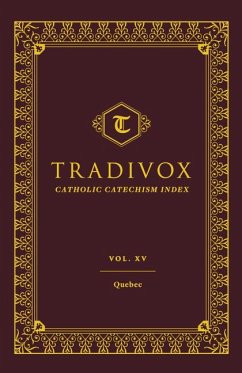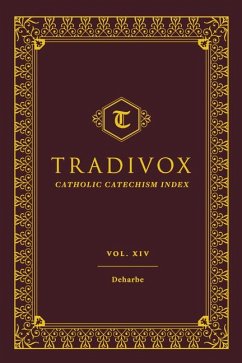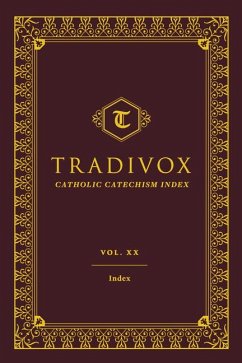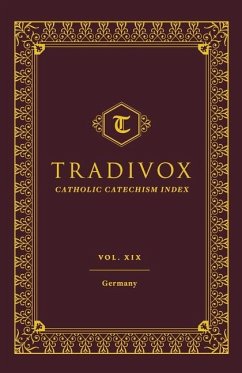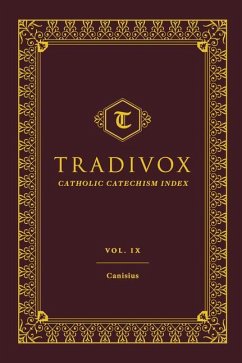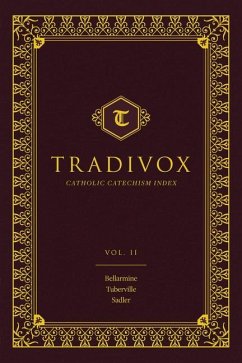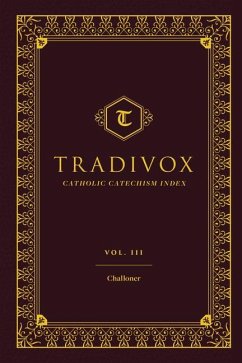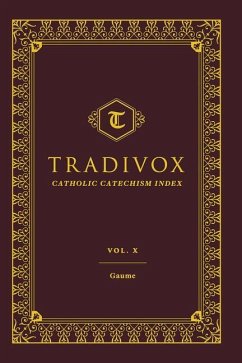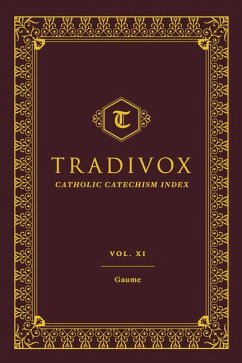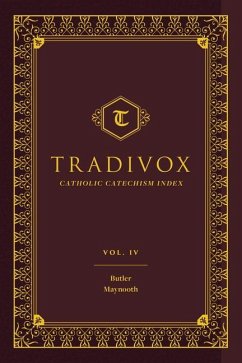
Tradivox Vol 16
Baltimore
Versandkostenfrei!
Versandfertig in über 4 Wochen
22,99 €
inkl. MwSt.

PAYBACK Punkte
11 °P sammeln!
It may be defensibly maintained that, in the United States of America, no single catechism has had a more expansive impact on Catholic religious education than A Catechism of Christian Doctrine, Prepared and Enjoined by Order of the Third Plenary Council of Baltimore, most commonly known as "the Baltimore Catechism," or even more simply, "the Baltimore." The work of many hands over several years, the Baltimore Catechism has shaped the religious education of American Catholics in countless schools, parishes, and mission societies across the continent, and continues to do so today. This volume o...
It may be defensibly maintained that, in the United States of America, no single catechism has had a more expansive impact on Catholic religious education than A Catechism of Christian Doctrine, Prepared and Enjoined by Order of the Third Plenary Council of Baltimore, most commonly known as "the Baltimore Catechism," or even more simply, "the Baltimore." The work of many hands over several years, the Baltimore Catechism has shaped the religious education of American Catholics in countless schools, parishes, and mission societies across the continent, and continues to do so today. This volume of the Tradivox collection includes the two most influential iterations of that text: the original catechism itself, unaltered as it came off the press in 1885, and Fr. Thomas Kinkead's expanded version, published six years later "for the use of Sunday-school teachers and advanced classes." The three Plenary Councils of Baltimore-held in 1852, 1866, and 1884-represented the first gatherings of the bishops in North America apart from Canada. The councils spanned a critical juncture in the history of the fledgling nation; not least of which being the bloody war for Southern independence, which ended just months before the opening of Baltimore II. In this period, the growing desire for an American catechism was generally felt, as evidenced by the remarkable efforts of Bishop John McGill of Richmond, who published his own catechism in 1865 within "the District Court of the Confederate States of America," and acknowledged: It is not only desirable, but even most necessary, that we should have some books of religious instruction for our people. ... [Thus] I have been induced, in view of our manifest need, to write and publish this volume, notwithstanding the difficulties attending such an enterprise in our present circumstances. This need would only increase with the explosive immigration to the continent between Baltimore II and III, when the Catholic population of America more than doubled in size in less than twenty years. The desire for a uniform catechism was met by the decrees of Baltimore III, which placed Catholic religious education among the principal issues of concern, in the face of a growing materialism in the culture and widespread opposition to Catholic schooling in public policy. In meeting these challenges, the Baltimore Catechism-especially the expanded edition by Fr. Kinkead - gives remarkable testimony to the kind of conflicted self-perception prevalent among American Catholics of the time. Intent on being an obedient citizen (largely in order to avoid the kind of continued persecution made famous by the Know-Nothing party), the American Catholic is bidden in the Baltimore Catechism to hail "the wise makers of the Constitution," and yet to regard the Roman pontiff's actions as done "with the authority of our Lord himself"-a disposition which, albeit somewhat exaggerated with regard to the doctrine of papal infallibility, must leave him ill at ease with his own national government, as Pope Pius IX's Syllabus of Errors (1864) had recently condemned several tenets that remain central to the American Constitution. While the original text of the Baltimore Catechism has been reproduced in this volume with no change, we have made a few minor adjustments to Kinkead's expanded edition that warrant exact description. First, we have clarified the author's anachronistic use of "viz." and "Maji," opting for consistency. Second, we removed the author's system of asterisk marks, which referenced a different contemporary edition that would have been confusing to include in this series. Third, we have withheld the "complete index of subjects" mentioned in the author's preface, the better to accord with the full series index found in Volume XX of the Tradivox collection. Finally, we added a few simple subheadings within some of the lengthier explanations, and clarified the wording of review question 798. We can confidently say that these minimal and cautious adjustments leave the reader in possession of the two most influential early editions of the Baltimore Catechism, as well as a helpful measure of historical insight for understanding the situation of American Catholics today.



